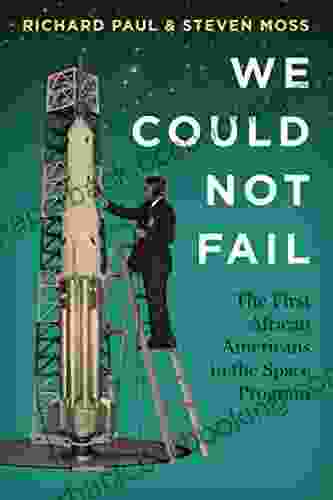Trailblazers in the Cosmos: The First African Americans in the Space Program

4.8 out of 5
| Language | : | English |
| File size | : | 7801 KB |
| Text-to-Speech | : | Enabled |
| Screen Reader | : | Supported |
| Enhanced typesetting | : | Enabled |
| Word Wise | : | Enabled |
| Print length | : | 394 pages |
| Lending | : | Enabled |
The story of the first African Americans in the space program is a testament to human perseverance, resilience, and the power of dreams. Against the backdrop of America's turbulent racial history, these courageous individuals broke down barriers and shattered stereotypes, inspiring a nation and the world. This article delves into the extraordinary lives and historic achievements of these pioneers, shedding light on their remarkable contributions to space exploration and their enduring legacy in American history.
A Long-Overdue Opportunity
The origins of the first African Americans in the space program can be traced back to the late 1950s, when the United States embarked on an ambitious quest to conquer space. However, it was not until 1961, at the height of the Cold War rivalry with the Soviet Union, that the National Aeronautics and Space Administration (NASA) made a conscious effort to recruit African American engineers, scientists, and astronauts.
This decision was not solely driven by a sense of justice or equality. In fact, it was largely a strategic move on NASA's part to demonstrate the nation's commitment to diversity and to counter Soviet propaganda that portrayed the United States as a racially divided country. Nonetheless, it marked a turning point in the history of space exploration and paved the way for a new generation of leaders to emerge.
The Mercury 13
The first group of African American astronauts, known as the Mercury 13, were selected in 1962. They underwent rigorous physical and mental testing, proving themselves just as capable as their white counterparts. However, they were ultimately denied the opportunity to fly into space due to NASA's concerns about their gender.
Despite this setback, the Mercury 13 remained committed to their passion for space. They served as ambassadors for the space program, inspiring countless young people of all races to pursue careers in science and technology. Their story became a symbol of the ongoing struggle for equality and representation in a male-dominated field.
Guion Bluford: The First African American in Space
In 1983, Air Force pilot Guion Bluford made history as the first African American to travel into space. His mission aboard the Space Shuttle Challenger marked a watershed moment, demonstrating that America's space program was truly inclusive.
Bluford went on to complete three more space missions, logging over 688 hours in orbit. He became a role model for African Americans across the country, inspiring them to believe that anything was possible with hard work and determination.
Mae Jemison: The First African American Woman in Space
In 1992, Mae Jemison broke another barrier when she became the first African American woman to travel into space aboard the Space Shuttle Endeavour. A doctor and engineer, Jemison had always dreamed of becoming an astronaut, and she pursued her passion with unwavering persistence.
Jemison's mission, which lasted nearly eight days, included conducting medical experiments and deploying a satellite. She became a symbol of hope and empowerment for girls and women everywhere, proving that there were no limits to what they could achieve.
Contributions to Space Exploration
The first African Americans in the space program made significant contributions to space exploration, both in terms of scientific knowledge and technological innovation. They worked on a wide range of projects, from designing and building space shuttles to conducting experiments on the International Space Station.
Their expertise and dedication helped to advance our understanding of Earth, the solar system, and the universe beyond. They also played a crucial role in shaping the future of space exploration, paving the way for future generations of scientists, engineers, and astronauts.
Challenging Stereotypes and Inspiring a Nation
Beyond their scientific achievements, the first African Americans in the space program also had a profound social impact. They challenged long-held stereotypes about race and ability, and they inspired a nation to believe in the power of equality.
Their presence in the space program sent a message to the world that America was a country that valued diversity and opportunity. It helped to break down barriers and create a more just and equitable society.
Legacy and Impact
The legacy of the first African Americans in the space program continues to inspire and motivate people to this day. Their stories are a testament to the human spirit's ability to overcome adversity and to achieve great things.
They have paved the way for countless other African Americans to pursue careers in science, technology, engineering, and mathematics (STEM). They have also inspired generations of young people to dream big and to believe in their own potential.
The first African Americans in the space program were true trailblazers who made an indelible mark on history. They overcame tremendous obstacles to achieve their dreams, and they inspired a nation to believe in the power of equality. Their legacy continues to inspire us to break down barriers, to embrace diversity, and to strive for a future where everyone has the opportunity to reach for the stars.
**Alt Attribute for Image:** Trailblazing African American astronauts in their space suits, symbolizing their groundbreaking achievements in space exploration.
4.8 out of 5
| Language | : | English |
| File size | : | 7801 KB |
| Text-to-Speech | : | Enabled |
| Screen Reader | : | Supported |
| Enhanced typesetting | : | Enabled |
| Word Wise | : | Enabled |
| Print length | : | 394 pages |
| Lending | : | Enabled |
Do you want to contribute by writing guest posts on this blog?
Please contact us and send us a resume of previous articles that you have written.
 Book
Book Novel
Novel Page
Page Chapter
Chapter Text
Text Story
Story Genre
Genre Reader
Reader Library
Library Paperback
Paperback E-book
E-book Magazine
Magazine Newspaper
Newspaper Paragraph
Paragraph Sentence
Sentence Bookmark
Bookmark Shelf
Shelf Glossary
Glossary Bibliography
Bibliography Foreword
Foreword Preface
Preface Synopsis
Synopsis Annotation
Annotation Footnote
Footnote Manuscript
Manuscript Scroll
Scroll Codex
Codex Tome
Tome Bestseller
Bestseller Classics
Classics Library card
Library card Narrative
Narrative Biography
Biography Autobiography
Autobiography Memoir
Memoir Reference
Reference Encyclopedia
Encyclopedia Kursat Ozenc
Kursat Ozenc Mir Sajjad Ali
Mir Sajjad Ali Mona Bijjani
Mona Bijjani Rick Rodgers
Rick Rodgers Shawn P Williams
Shawn P Williams W Ron Adams
W Ron Adams Miranda Kenneally
Miranda Kenneally Sopan Deb
Sopan Deb Tamonya Sands
Tamonya Sands Nicolette Marie Angelique
Nicolette Marie Angelique Maureen Chiquet
Maureen Chiquet Steve Angers
Steve Angers Lori Morrison
Lori Morrison Rachel Mitchell
Rachel Mitchell Knox Mcgal
Knox Mcgal Robert K Yin
Robert K Yin William H Schaberg
William H Schaberg Raymond H Thompson
Raymond H Thompson Theresa Smythe
Theresa Smythe Tina Dreffin
Tina Dreffin
Light bulbAdvertise smarter! Our strategic ad space ensures maximum exposure. Reserve your spot today!

 Fabian MitchellSaul Bass: Anatomy of Film Design - The Screen Classics That Defined an Era
Fabian MitchellSaul Bass: Anatomy of Film Design - The Screen Classics That Defined an Era Lawrence BellFollow ·10.8k
Lawrence BellFollow ·10.8k Stuart BlairFollow ·16.2k
Stuart BlairFollow ·16.2k Aldous HuxleyFollow ·14.2k
Aldous HuxleyFollow ·14.2k Christian BarnesFollow ·6.4k
Christian BarnesFollow ·6.4k Charles ReedFollow ·7.5k
Charles ReedFollow ·7.5k Yasunari KawabataFollow ·13.3k
Yasunari KawabataFollow ·13.3k Hector BlairFollow ·18.6k
Hector BlairFollow ·18.6k Percy Bysshe ShelleyFollow ·2.2k
Percy Bysshe ShelleyFollow ·2.2k

 E.M. Forster
E.M. ForsterBluewater Walkabout: Into the Pacific
An Unforgettable...

 Joseph Foster
Joseph FosterUnlock the Secrets of Standardized Test Success with Test...
Are you tired of struggling with standardized...

 Joe Simmons
Joe SimmonsUnlock Learning with Flash Cards for Kindergarten:...
Ignite a Passion for...

 Raymond Parker
Raymond ParkerJourney into the Enchanting World of "The Heart Kingdom"...
A Timeless Tale of Love,...
4.8 out of 5
| Language | : | English |
| File size | : | 7801 KB |
| Text-to-Speech | : | Enabled |
| Screen Reader | : | Supported |
| Enhanced typesetting | : | Enabled |
| Word Wise | : | Enabled |
| Print length | : | 394 pages |
| Lending | : | Enabled |














